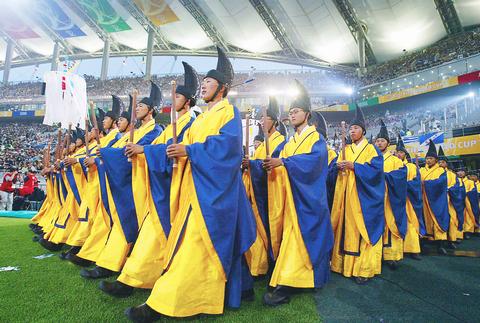Co-host South Korea put on a spiritual show mixing ancient tradition and high tech as the 2002 World Cup officially opened yesterday, moments before France began its title defense against Senegal.
Japanese Prime Minister Junichiro Koizumi and newly re-elected FIFA president Sepp Blatter gave speeches at Seoul's 64,000-seat World Cup stadium. The latter was jeered by some fans.

PHOTO: REUTERS
South Korean President Kim Dae-jung declared the tournament officially open at 7:44pm, and fireworks flew from both sides of the roof to mark the ceremony's start.
Around the globe, more than 500 million people watched on television as 2,300 performers -- half of them in traditional folk costume -- entered the stadium for a 40-minute display of jaw-dropping creativity.
Outside the stadium and across the capital city, 420,000 police and military personnel were involved in an enormous security operation. Helicopters and fighter jets scoured the skies, and anti-aircraft missiles have been deployed near stadiums with the terrorist attacks of Sept. 11 in mind.
A thick circle of yellow-clad dancers formed in the center of the field, then gave way to women in pale green dresses who performed a traditional Korean royal court dance.
The zippier second stage saw futuristic silver dancers surrounded by creatures with TV sets for heads. Four high-tech drummers floated down from the roof onto stands with flashing lights and screens.
The entire field was then swathed in white sheets, from below which rose a bell as high as a house. Screens on the bell showed scenes of suffering and poverty from around the world.
An upbeat dance closed the ceremony as paper soccer balls dropped from the sky.
A huge cloud of mist hovered above the oval opening in the stadium roof and temperatures were about 20?C. A cool breeze blew through the stands.
Hundreds of fans in the south stands wore yellow T-shirts in support of Senegal, while the opposite end was a sea of blue-clad France supporters.
Many fans have come from abroad to support their national teams playing in South Korea and Japan, while South Koreans also have organized groups to welcome and cheer on various squads.
Hundreds of security officers vetted fans and journalists as they passed into the stadium, thoroughly inspecting all bags and even passing metal-detection devices over bulky books.
Missing from the festivities, however, was Japan's Emperor Akihito.
Though officials on both sides have tried to play it down, Akihito's conspicuous absence from yesterday's ceremony reflects the limits of soccer diplomacy -- and how deeply the wounds of war and occupation continue to affect relations between the two Asian neighbors.
Representing the palace was Akihito's cousin, Prince Takamado, and Takamado's wife, Princess Hisako. They are the first members of Japan's royal family to visit Korea since the end of World War II. Japan's surrender in 1945 opened the way for the independence of Korea, which had been a Japanese colony since 1910.

SECURITY: As China is ‘reshaping’ Hong Kong’s population, Taiwan must raise the eligibility threshold for applications from Hong Kongers, Chiu Chui-cheng said When Hong Kong and Macau citizens apply for residency in Taiwan, it would be under a new category that includes a “national security observation period,” Mainland Affairs Council (MAC) Minister Chiu Chui-cheng (邱垂正) said yesterday. President William Lai (賴清德) on March 13 announced 17 strategies to counter China’s aggression toward Taiwan, including incorporating national security considerations into the review process for residency applications from Hong Kong and Macau citizens. The situation in Hong Kong is constantly changing, Chiu said to media yesterday on the sidelines of the Taipei Technology Run hosted by the Taipei Neihu Technology Park Development Association. With

CARROT AND STICK: While unrelenting in its military threats, China attracted nearly 40,000 Taiwanese to over 400 business events last year Nearly 40,000 Taiwanese last year joined industry events in China, such as conferences and trade fairs, supported by the Chinese government, a study showed yesterday, as Beijing ramps up a charm offensive toward Taipei alongside military pressure. China has long taken a carrot-and-stick approach to Taiwan, threatening it with the prospect of military action while reaching out to those it believes are amenable to Beijing’s point of view. Taiwanese security officials are wary of what they see as Beijing’s influence campaigns to sway public opinion after Taipei and Beijing gradually resumed travel links halted by the COVID-19 pandemic, but the scale of

A US Marine Corps regiment equipped with Naval Strike Missiles (NSM) is set to participate in the upcoming Balikatan 25 exercise in the Luzon Strait, marking the system’s first-ever deployment in the Philippines. US and Philippine officials have separately confirmed that the Navy Marine Expeditionary Ship Interdiction System (NMESIS) — the mobile launch platform for the Naval Strike Missile — would take part in the joint exercise. The missiles are being deployed to “a strategic first island chain chokepoint” in the waters between Taiwan proper and the Philippines, US-based Naval News reported. “The Luzon Strait and Bashi Channel represent a critical access

Pope Francis is be laid to rest on Saturday after lying in state for three days in St Peter’s Basilica, where the faithful are expected to flock to pay their respects to history’s first Latin American pontiff. The cardinals met yesterday in the Vatican’s synod hall to chart the next steps before a conclave begins to choose Francis’ successor, as condolences poured in from around the world. According to current norms, the conclave must begin between May 5 and 10. The cardinals set the funeral for Saturday at 10am in St Peter’s Square, to be celebrated by the dean of the College